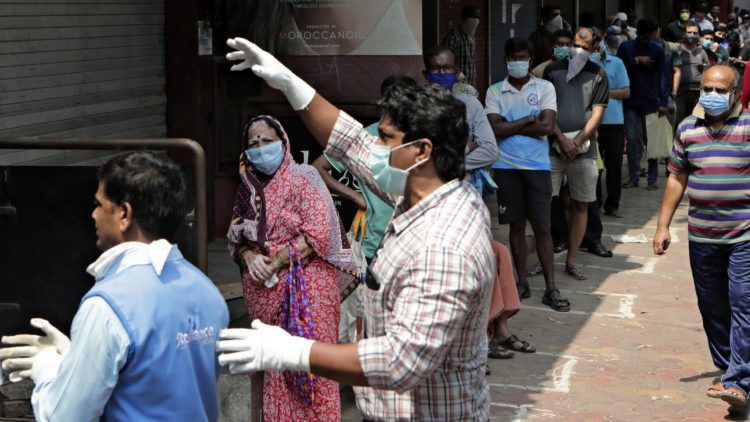Lockdown is going on, through trials and tribulations. People have complained about the adverse impact of its sudden announcement on poor people and daily labourers. Be that as it may, post-lockdown concerns are much more alarming. While the objective of the lockdown is to slow down the spread of COVID-19 in India, the spread of the virus seems to be gathering speed.
For this reason, the debate is now whether to continue lockdown or not. If the lockdown continues as it is now, India may soon be staring at the face of another bigger problem: hunger and citizen disobedience. As governments have acknowledged, access to food is a problem that needs attention. Despite relief efforts, vast number of otherwise working sections are not able to get food to a satisfactory level. We have food stocks. But with the rickety, corrupt and inefficient Public Distribution System (PDS), additionally burdened by lockdown conditions, food stocks have yet to reach the needy in many locations. Many concerns of the current lockdown period are likely to continue or become bigger if the lockdown continues.
First, food availability may not be an issue, given the stocks, but surely distribution is. There is yet no major appreciable initiative on food distribution that has been efficient and fast, while targeting the most deserving families. Secondly, current rabi food crops are in the fields to be harvested. We are dependent on manual labour for harvesting, preliminary processing, transport and stocking these rabi harvests. With labourers being confined to homes or roads or urban relief camps, when and how to secure this food is another cause of concern. This concern is also entwined with farmers’ expectations of income and the cost of procurement on the public exchequer. Various State governments have announced procurement plans, but an implementable strategy is missing in almost all of these plans.
With most predictions that the COVID-19 pandemic will continue for a 12-18 months period, the non-working economy requires the primary sector to respond. A population idling at home requires food, above everything else. For this reason, kharif food production is a prospective concern. Anticipating internal food shortages due to lack of production, country after country is locking down their food exports. Even States in India are gearing up to ‘ban’ food exports outside their borders. Taking into consideration that food imports are not possible, we need to augment our food stocks through a dynamic food production plan. The coming agricultural season needs to be planned and envisioned in such a way as not to disturb anti-COVID-19 operations, nor dissipate energies of communities. For this reason, I have been arguing for preparation of a kharif plan, which considers all the factors, and yet prioritises food production. It is not difficult, in India, in comparison with other countries. Rainfall is an uncertain factor. However, we can and need to secure all the factors of production for the oncoming agricultural season.
To begin with, governments should prioritise food crops, by actively dissuading farmers from going to their conventional choices of crops. It should also develop confidence among farmers that this plan will get them food and a chance to earn a decent income. A local procurement plan is going to be a necessity. This procurement should inherently include primary processing, otherwise the whole plan becomes redundant. Additionally, local distribution should be the top priority, even while actions to move the surplus to other needy areas are integrated into the plan. With ‘urban’ labour moving back to their own villages, this can be a strength and weakness as well. Previously, most have moved out for better incomes, and lack of work in villages, or being landless. An upcoming kharif plan should be able to include them, appropriately, so that their daily food needs are taken care of, within the village food production cycle, without being completely dependent on ‘external’ PDS supplies. Further, landless families, who left the village for food, water and work, and small and marginal farmers, who thought urban wages can supplement their incomes, will come back to their native places and hearths. I expect more ‘urban’ labour to move back to villages, once the lockdown is relaxed, at the most opportune time, for two reasons. First, they are sure that work in urban areas is not going to pick up in the near future. Second, they think their hunger can be taken care of in their own village. Post-lockdown, governments should think of village-level stocking of food, because centralised, FDI-level (Food Corporation of India) godowns will disrupt anti-COVID-19 operations. Local food for local populace should be prioritised. Economics of such prioritisation can be of least concern, if hunger becomes a serious social problem.
Given this scenario, both rabi crop harvests and coming kharif season need more attention from Central government and all State governments. In more developed countries, where populations dependent on primary sectors is low, the collapse of economies will hit them hard. In contrast, India has the advantage of an existing rural economy. This rural economy needs to be reinvigorated. However, it cannot be rebuilt on the foundations of modern agriculture, but should be based on sustainable agriculture principles. Food production and the entire structure of rural economy around such production has to respond to principles of sustainability, equity and justice.
__________________________________
Dr. Narasimha Reddy is a member of the Board of Directors of Pesticide Action Network India.








Discussion about this post